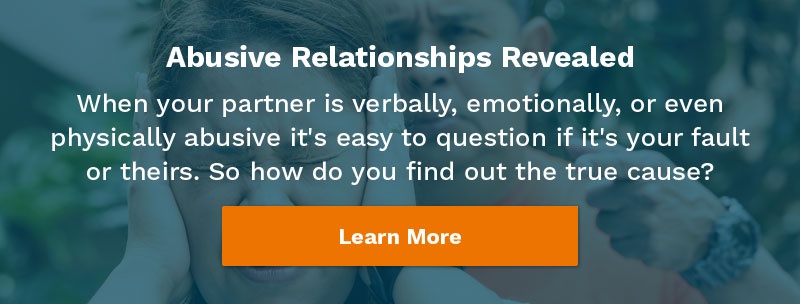
4 Min Read
Contents
- Identifying Verbal Abuse
- Stopping Verbal Abuse
- If Verbal Abuse Stops Can It Start Again?
- What To Take Away
- What Readers Say (70+ comments)
Part 2 of 2
So, you're in a relationship with verbal abuse and struggling.
Whether you’ve suffered for a long time or are just realizing that the person you’re with is not the person you thought they were, verbal abuse is painful. Both the words and accepting that the person you love treats you this way hurts.
The important thing to know now is that you can begin to make changes.
But what do those changes look like?
How do you begin putting a stop to verbal abuse – especially if you still love the person you’re with?
Identifying Verbal Abuse
The first thing you need to do is determine if what you’re experiencing is abuse.
Verbal abuse can be hard to identify. Unlike physical abuse, there are no bruises or broken bones that give it away.
There are, however, always signs.
Of course, it can be hard to see those signs if you're the one experiencing the abuse. You may have become so accustomed to the treatment or have been told so often that this is what love is, that you don’t even realize something’s wrong.
If you're not sure if that's you, or if what you’re experiencing is really abuse, then read this article about verbal abuse signs: Verbal Abuse - What's It Look Like? Are there Signs?
Stopping Verbal Abuse
The second thing you need to do if you’re suffering with verbal abuse is understand how to make it stop.
It would be nice if putting an end to verbal abuse was as easy as asking the person to stop.
Unfortunately, it’s not.
Below are 8 things you can do to stop verbal abuse from the article How to Handle Verbal Abuse in Your Relationship by Cathy Meyer. I've included my take (in italics) on how they compare to my experience.
- Abuse is never justified so you should never feel that it is your fault.
Guilt is a tool that abusers will use to keep control over you. If you’re being abused there is nothing you have done to justify it. The behavior of the abuser is the problem, not you, so taking a stand against it and protecting yourself is the right thing to do.
2. Let the abuser know how hurtful their words are and discuss with them the fact that it is unacceptable to you. Set boundaries on what you will and will not accept from your abuser.
This is easier said than done, but it is necessary. Abusers don’t see the problem with their actions. You may need the emotional support of a loved one or friend to hold firm to the boundaries you’re setting.
3. Seek counseling, either together or separately.
Generally speaking, abusers can’t change their behavior overnight. Whatever has caused them to become abusive is likely a much deeper problem that will take time to resolve. And the emotional damage that’s been done to you can be difficult to undo as well. It's almost certain that you’ll each need the help of a counselor to get back to a healthy place.
4. Surround yourself with a support system of family and friends. Discuss with them what is happening and how you are feeling.
This is crucial as secrecy and silence, which is common in abusive relationships, enables the abuse. Having support will help keep you strong and safe. Family and friends can also help prevent you from falling back into accepting the abusive behavior as normal by giving you the perspective you need.
5. If the verbal abuse escalates to physical abuse, leave. Your personal safety is far more important than the relationship.
It doesn’t take professional experience to know that this is the right thing to do. It’s advice any one of us would give. However, even though it's necessary, it's never, ever easy to do.
6. Do not engage in conflict with your abuser. If your spouse becomes angry stay calm, walk away and don’t give him/her what they want…a reaction from you.
Be prepared to leave if necessary. Sometimes distance is the only way to diffuse things and stop verbal abuse.
7. Take back your power. If you react to the abuser, you are rewarding them. Letting them know they have power over your emotions. Don’t allow the abuser to have control over how you feel.
In my professional experience this can be very difficult. When you love someone you’ve already allowed them to influence your feelings. Remind yourself that abusive behavior is NOT a part of love and you deserve better. Do your best to control your emotions until you’re apart and in a private, safe place to deal with how you feel.
8. Leave the marriage. If setting boundaries, getting therapy and refusing to respond to the abuse doesn’t work, then maybe your marriage is over. There are times when the best thing you can do for yourself is, break all ties with your abuser.
This is a last, but sometimes necessary, resort. However, there should be a process to get there. Separation and divorce doesn’t fix everything. So, you’ll need to develop better coping skills first, as well as giving change an opportunity by using the right approach.
If Verbal Abuse Stops Can It Start Again?
The sad truth is, yes.
However, if the person who’s been doing the abusing has been successful at efforts to change, then they can do it again. This will also mean that you'll need to revisit the steps above to protect yourself and help them reset their behavior.
But, if this cycle continues, you may also need to ask yourself some hard questions.
- Are your boundaries strong enough?
- Have you been enforcing them consistently?
- How many slips and restarts are you willing to put up with?
At some point, step 8 from above may be your only real choice to change an abusive relationship.
What To Take Away
The most important thing to remember about verbal abuse is that its purpose is to control.
The key to stopping it is learning how to break free of the control and get your power back.
Doing this means,
- Communicating your feelings
- Setting boundaries
- Being firm on those boundaries
- Being willing to leave if necessary
Don't underestimate how difficult these can be though.
In order to successfully stop verbal abuse, it's critical to have the guidance and coaching of an experienced professional counselor. So, don't go it alone any longer.,
This is the second article of two on verbal abuse. In the first article we looked at verbal abuse signs. Sign-up for Our Blog at the bottom of this page and don't miss other informative articles.
Editor's Note: This post was originally published on September 4, 2010 updated on September 18, 2018, and updated again with new information for accuracy and comprehensiveness.
Looking for More? Check Out These Articles
- What Are The Warning Signs Of Verbal Abuse? (Part 1)
- How To Say No More To Abusive Relationships
- Signs To Look For If You Think You Have Issues With Anger
- Get More Help with an Abusive Relationship
























































73 Comments
Click here to read/write comments